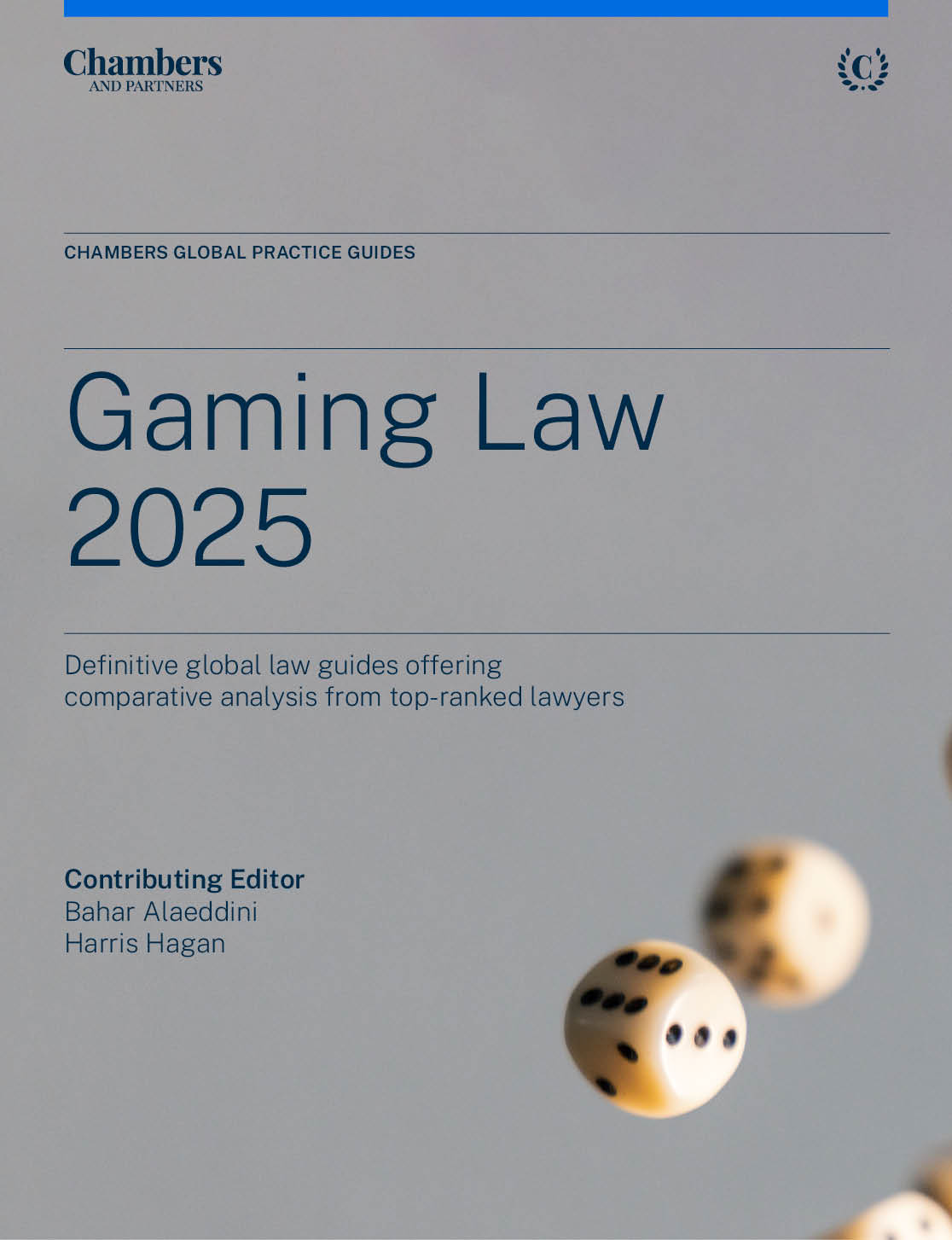
Gaming Law 2025
The Gaming Law 2025 guide covers 29 jurisdictions. The guide provides the latest legal information on land-based and online gambling, B2C and B2B licences, application requirements, affiliates, white labels, responsible gambling, AML legislation, acquisitions and changes of control, and restrictions on advertising, as well as on trends in social gaming, esports, fantasy sports, blockchain, and taxation.
Last Updated: November 25, 2025
Compare law and practice by selecting locations and topic(s)
Select Locations

Select Topic(s)

Please select at least one location and one topic to use the compare functionality.
Booms and Bans: A Global Overview of the Gambling Industry
Harris Hagan is again pleased to introduce the Chambers Global Practice Guide to Gaming Law. The 2025 edition – albeit not an exhaustive text on gambling law – is a guide to the licensing and regulatory regimes in many of the major global markets. As the editor, I hope that its geographical coverage and the information provided on the regulatory frameworks around the world continue to serve as a helpful guide to in-house and private practice lawyers, gambling businesses, and other industry stakeholders.
This year’s guide brings together leading gaming law experts from around 30 jurisdictions. It continues to provide guidance on the framework that applies to all types of regulated gambling, while setting out the current outlook and recent changes in each jurisdiction at the time of writing.
Gambling ecosystem
Gambling remains a popular leisure activity, with industry analysts estimating global gambling revenues will reach USD700 billion by 2028. It also remains an important revenue generator for many countries by contributing significant tax revenues to the public purse, attracting investment, creating jobs, attracting tourists, and funding certain public initiatives. A properly regulated market is key to the future sustainability of the gambling ecosystem. The ongoing challenge for the gambling industry – affecting its long-term sustainability – is balancing the need to protect consumers with the risk of hindering economic growth through excessive or unnecessary regulation. Legal and regulatory changes must be backed by evidence.
Although there are cultural nuances stemming from national history, religious, sociocultural factors and local customs in each jurisdiction, the proliferation of smartphones and “smart living” has driven player behaviour and demand for online gambling in recent years. At the same time, public and political scrutiny has increased, with the future of the gambling industry currently looking uncertain in certain jurisdictions – for example, the UK, where significant tax increases are expected as part of the 2025 Autumn Budget. What remains key is finding the right balance between consumer freedoms and protecting those harmed by gambling, while also recognising that most gambling businesses are privately owned and operate cross-border.
As the global gambling industry continues to grow and evolve, the regulatory landscape continues to adapt to new challenges, opportunities and technologies. Throughout 2025, two key challenges have been concerns about illegal gambling and the prediction markets, and these issues will continue to be hotly debated well into 2026.
Illegal gambling is a global threat
The illegal gambling market remains a significant and persistent challenge around the world, with industry research suggesting it is worth a staggering USD1.7 trillion globally. Despite extensive efforts by governments and regulators, illegal operators and suppliers continue to thrive. This underground market not only undermines the regulated gambling ecosystem – particularly given links to organised crime – but also poses a fundamentally serious risk to players, who do not receive any of the same consumer protections.
Although there are jurisdictional differences, what is very clear is that a multifaceted approach is essential to effectively combat the illegal gambling market, particularly where gambling regulators do not have criminal powers or extraterritorial reach. We welcome INTERPOL’s late-2024 operation SOGA X, which made more than 5,100 arrests and recovered more than USD59 million, together with the partnership between the American Gaming Association (AGA), the Betting & Gaming Council (BGC) and the European Casino Association (ECA).
M&A activity
This year was a busy year for transactions, with a number of high-profile transactions closing – most notably, two private equity deals that saw Apollo funds acquire IGT’s digital and gaming businesses and Everi for USD6.3 billion, and Brightstar acquire AGS for USD1.1 billion, as well as Intralot’s acquisition of Bally’s online business for EUR2.7 billion. M&A activity in the second half of 2025 has been quieter owing to the macroeconomic climate; however, the tide is expected turn in 2026.
Predicting the predictions markets
The predictions market has dominated the US betting market in 2025 by posing the simple question of what is meant by a bet. Kalshi and Polymarket (known as “predictors”) are federally regulated by the Commodity Futures Trading Commission (CTFC) and therefore fall outside the authority of state gambling regulators, who argue that laying money on the outcome of a sports event is sports betting and should be regulated by them.
It therefore comes as no surprise that many US state regulators have issued cease and desist orders against predictors. Kalshi processed more than USD1 billion in sports wagers from 3.4 million bets in the second half of 2025, which gives an insight into state legislators’ concerns about missed revenues, risks to the sports betting ecosystem, and the lack of consumer protections. At the time of writing (November 2025), Polymarket opened a market on whether predictions would be banned in 2025, with a 40% chance (marking an increase from 10% the previous month). Also in November 2025, Flutter and DraftKings left the American Gaming Association owing to their prediction market plans.
Emerging markets
Emerging gambling markets continue to transform the global landscape and spark enthusiasm, particularly given the higher costs of operations and compliance in mature regulated markets. As newer markets emerge, they offer significant opportunities and risks to gambling businesses.
In January 2025, after a turbulent period, Brazil regulated online betting. In North America, online gambling is expected to launch in Alberta in 2026. Nigeria continues to be at the forefront of Africa’s booming gambling market. In the Middle East, all eyes remain on the UAE, as the regulator has indicated online gambling will be live before the end of 2025. Closer to home in Europe, the role of the newly established Irish gambling regulator will continue to expand as the country transitions to the new regime.
